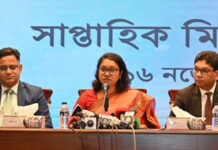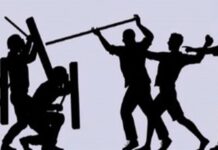
While the media has not published the report denounced by the government as a conspiracy to tarnish the image of the authorities, they have published the government’s response. On 2 February the media published the foreign ministry’s statement in this regard. In the 24 hours before that, the issue evoked strong debate and discussion on the electronic media. The centre of the storm was ‘All the Prime Minister’s Men’, a report aired on 1 February by Al Jazeera, the television channel owned by Qatar’s royal family.
The Bangladesh army headquarters also published a rejoinder, but there too no mention was made of details of the allegations. The matter was so constrained and uneasy, that the Daily Star published an editorial saying it was a strange situation having to publish only the government’s reaction to something, but not the contents of the actual report.
There had been a 30 second video clip aired for a few days before the actual documentary report was aired. The clip was enough to reveal sensitive material was in the offing. Many feared that the government may block the documentary from being aired here but there general feeling is that the government was wise enough not to do so.
However, I feel there were two reasons behind this decision. One, past experience showed that attempts to suppress information are never successful. Two, there is no need here to react to the sensitive material in the manner of other democratic states. There is no strong opposition in the country and the civil society also lacks the gumption to stand up in protest. Most of them are of the government’s political ilk or are simply opportunists. There was no reason to bother about a civil society who has been able to do nothing to build any resistance against one farcical election after another. The entire democratic process of power changing hands had been rendered ineffective so these small irritants apparently did not bother the government.
All this had led to a landslide of criticism in the social media against journalists. Many are questioning, what are the journalists in the country doing? Why isn’t such investigative journalism carried out within the country? And Al Jazeera’s critics along with government supporters go a little further to say that the documentary showed nothing new, other than a little over-dramatisation. Some even claimed that everyone already knew these facts. These government loyalist media outlets don’t realise by saying so, they are berating themselves. They are proving the contention of critics who maintain that journalists who are beneficiaries of the government suppress sensitive information rather than revealing the truth.
Two instances must be given here to show the cloud of fear that actually enshrouds the media. The first is about news on the appointment of the army chief. When the news portal bdnew24 released the news that the chief’s brother was the Josef, sentenced in a murder case and recipient of the president’s pardon, the website was shut down for a few hours. The second instance was the demand to take action against Prothom Alo for publishing in advance the investigation report pertaining to the killing of retired army major Sinha Mohammad Rashed Khan in Teknaf.
There are innumerable examples of just how dangerous it is to carry out investigative reporting into various criminal activities. The fact remains, no media outlet is free of the struggle to survive and of the pain and frustration of not being able to carry out investigative journalism. Over the past decade, journalists of the top newspaper in the country have been banned from the prime minister’s office. There has been a clamp down in it receiving advertisements of private companies too. And now, added to all that, is the digital security act.
Interestingly, there is a wide gap between the foreign ministry’s statement and the rejoinder of the army headquarters. The foreign ministry has termed the Al Jazeera documentary as a Jamaat-backed conspiracy. The army headquarters had not mentioned any party. It mentions two journalists and one former army cadet. The rejoinder refers to their past and questions how they are involved with an international media outlet like Al Jazeera. Among the allegations, it only referred to the matter of procuring surveillance technology from Israel. It said that the equipment was bought from Hungary, not Israel. Al Jazeera’s claim is that this technology bought from Hungary is Israeli equipment and Israelis provided the required training too. About the other allegations it was said that video clips were strung together from various sources and a voice over used. But no rejoinder was given to the other allegations.
It may be recalled that Al Jazeera had identified the main persons behind the scandal in Malaysia that send Najib Razzak to jail. In the Maldives too, former president Abdullah Yamin is now in jail following Al Jazeera’s investigations
The foreign ministry’s main contention was that this was a conspiracy of false propaganda, but it made no rejoinder to any of the allegations. It is not clear how so much credit is given to Jamaat-e-Islami as being part of this ‘conspiracy’ when the party’s image is quite seriously tarnished at home and abroad. So long BNP had been blamed for conspiring against the government, but this time it has not been so. Perhaps advantage is being taken of the western world’s apprehensions concerning Islamic extremism. The foreign ministry’s statement said that the report had no mention of the ‘horrific genocide of 1971.’ What sort of logic is that? What relevance has the 1971 genocide got in this report? And if it mentioned the genocide, would that place the report above all question?
Any enemy state of Bangladesh can surely create a conspiracy, but then that must be answered in an informed and effective manner. Without given any counter-evidence, it was just said that the government is considering legal action. The question is, why was the opportunity not taken to stand in defence against the allegations? At the end of the documentary it was said that statements had been sought from all whose named appeared in the report so that they could defend themselves, but no one responded from Bangladesh. So what space is there left for legal recompense?
Another group, to prove that Al Jazeera is not credible, has come up with a list of countries where the news channel is banned. Perhaps they want Bangladesh to be like the countries on the list. Like Egypt, where democracy has been exiled in the name of suppressing Islamists and where local and foreign journalists are behind bars.
The sooner we accept that these debates and discussion will not resolve the main question, the sooner it can be resolved. In order to resolve the actual question, each and every allegations needs to be investigated thoroughly. The allegations are not just against an institution. There are questions pertaining to forged passports, fake bank accounts, motives behind police and RAB operations and the role of our diplomats in three countries of two continents. Media in Hungary reports that investigations have already begun there about a fugitive criminal staying and investing there under a fictitious name. So it certainly is not prudent on the part of the authorities to avoid investigating these allegations themselves.
Kamal Ahmed is a senior journalist based in London. The article, originally published in the Bangla edition of Prothom Alo, has been rewritten for English edition by Ayesha Kabir









